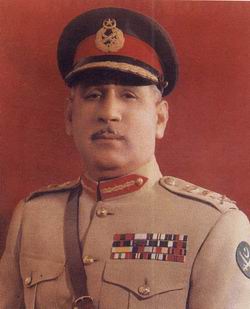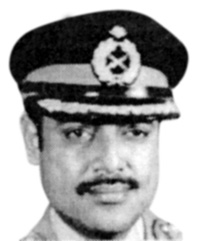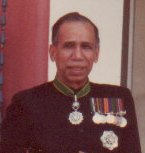
Tikka Khan was a Pakistani military officer who served as the first chief of the army staff from 1972 to 1976. Along with Yahya Khan, he is considered a chief architect of the 1971 Bangladesh genocide which according to independent researchers led to the deaths of 300,000 to 500,000 people.

Mohammad Ataul Gani Osmani was a Bangladeshi military officer and revolutionary. His military career spanned three decades, beginning with his service in the British Indian Army in 1939. He fought in the Burma Campaign during World War II, and after the partition of India in 1947, he joined the Pakistan Army and served in the East Bengal Regiment, retiring as a colonel in 1967. Osmani joined the Provisional Government of Bangladesh in 1971 as the commander-in-chief of the nascent Bangladesh Forces. Regarded as the founder of the Bangladesh Armed Forces, Osmani retired as the first full general from the Bangladesh Army in 1972.

Major General Khaled Mosharraf BU was a Bangladeshi army officer who is known for his role in the Bangladesh Liberation War and the subsequent coups in post-independence Bangladesh. After deposing Khondakar Mustaq Ahmad in the 3 November 1975 coup, Mosharraf was assassinated on 7 November 1975.

Abdur Rahman Biswas was a Bangladeshi politician. He was the President of Bangladesh from 1991 to 1996. Biswas represented Pakistan at the United Nations General Assembly prior to the independence of Bangladesh.
Muhammed Abul ManzurBU was a Bangladeshi military officer who commanded the Bangladesh Forces operations in Sector 8 during the Bangladesh Liberation War against Pakistan in 1971. He was allegedly involved in the assassination of the then-president of Bangladesh, Ziaur Rahman. The erstwhile chief of army staff and alleged mastermind of Rahman's assassination, Hussain Muhammad Ershad, had put a standing shoot-to-kill order on Manzur's life—he was killed shortly after being captured at the border. About a year later, Ershad initiated a bloodless coup d'état and took over the central government, holding power until 1990.
Shafaat Jamil, Bir Bikrom was a Bangladesh Army colonel. He was the commanding officer of the 3rd East Bengal Regiment of Z Force Brigade in Sector 11 of Bangladesh Forces during the War of Bangladesh Independence in 1971. He was among the first Bengali officers who rebelled against the Pakistani Army in the 1971 Liberation War of Bangladesh and later fought in 11 sector and in Sylhet sector.
Hasan Mashhud Chowdhury was a Bangladesh Army general who was 11th Chief of Army Staff of the Bangladesh Army from 16 June 2002 to 15 June 2005. He was the last officer to serve in this position who had first been commissioned by and served with the Pakistani Army, before the Liberation War of 1971. He served for two years before the war.

The President Guard Regiment is a cavalry regiment of Bangladesh Army under the Executive Office of the President of Bangladesh. It is located at Dhaka Cantonment, Banga Bhaban and Ganabhaban. It provides military support for all security functions; including presidential travel, general medical support, emergency medical services, and hospitality services. The PGR is headed by the Military Secretary to the President and the Commander, President Guard Regiment. The regiment was created by President Ziaur Rahman in 1976. It was originally designated as the Presidential Security Force. The PSF was restructured and upgraded to full regimental status by President Hussain Muhammad Ershad in 1982 and the new title of President Guard Regiment was adopted.

Jahangir Alam Chowdhury is a retired Lieutenant General of the Bangladesh Army and former Director General of the Bangladesh Rifles during the conflicts with Border Security Force of India and skirmishes with Banga Sena group in the Bangladesh–India border. He has been serving as an adviser of the Interim Government of Bangladesh since 16 August 2024.

Quazi Golam Dastgir was a Bangladesh army general and diplomat. From 1975 to 1977, he served as the "Zonal Martial Law Administrator" for Dhaka Division.

Chitta Ranjan Dutta Bir Uttom, also known as C R Dutta, was a Bangladeshi war hero who served as major-general of the Bangladesh Army. He was a key sector commander of the Mukti Bahini during the Bangladesh Liberation War. After independence, he served as the armed forces commander in Rangpur and later went on to become the first director-general of the Bangladesh Rifles in 1973.

Z Force, also known as Tura Brigade, was the first military brigade of Bangladesh Forces, formed during the Liberation War of Bangladesh in 1971 under Major Ziaur Rahman along with the consent of the revolutionary government of Bangladesh in exile. The brigade was formed with the 1st, 3rd and 8th Battalion of East Bengal Regiment on 7 July 1971. It is the first ever complete brigade formed during the Liberation War of Bangladesh in 1971.
General Lionel Piyananda Balagalle,, was a senior Sri Lanka Army officer, who served as the Commander of the Sri Lanka Army and the Chief of the Defence Staff. He is known for formalising military intelligence operations within the Sri Lanka Army, having founded the Directorate of Military Intelligence and the Military Intelligence Corps.
Brigadier Sikandar Khan was the commander of the artillery corps of the IV Corps in Pakistan Army. He was due to retire in 2014, but voluntarily retired in 2013 as a one-star general to run his own security company, Ever Ready Security Management (Pvt) Ltd. He was offered to be the director of National University of Modern Languages after his retirement but he respectfully declined to focus on expanding his security company. Khan has been awarded the Sitara-i-Imtiaz for his distinguished service.

Amin Ahmed Chowdhury was a Bangladeshi army officer and diplomat.

Aziz Ahmed SBP(BAR) is a controversial retired Bangladeshi four star general who was Chief of Army Staff (CAS) of the Bangladesh Army, from 25 June 2018 to 24 June 2021. He was succeeded by General SM Shafiuddin Ahmed on 24 June 2021.

Molla Fazle Akbar was a three-star rank Bangladesh Army officer. A Lieutenant General and the former Director General of Directorate General of Forces Intelligence. After retirement he served as the Chief advisor of Regent Airways, Bangladesh operating in domestic and international routes and the chairman of the board of directors of a financial institute, Bangladesh Industrial Finance Company Limited (BIFC) as well as Vice Chairman of the board of directors of a commercial Bank, Union Bank Limited.
{{Infobox military person | name = Sarwar Hossain | image = | birth_date = 16 January 1966 | birth_place = Dacca, East Pakistan, Pakistan | allegiance = Bangladesh | branch = Bangladesh Army | rank = Major General
| serviceyears = 1986-2020 | unit = East Bengal Regiment | commands =* Commanding Officer of 4 East Bengal Regiment

Muhammad Enayet Ullah is a retired major general of the Bangladesh Army. He was adjutant general at the Bangladesh Army Headquarters.
Mohammad Ziauddin, BU is a retired Bangladeshi military officer, who was the Commanding Officer of the 1st East Bengal Regiment during the Bangladesh Liberation War. He was awarded the Bir Uttom, the country's second highest gallantry award for his outstanding bravery in the Liberation War. His certificate number was 22.













